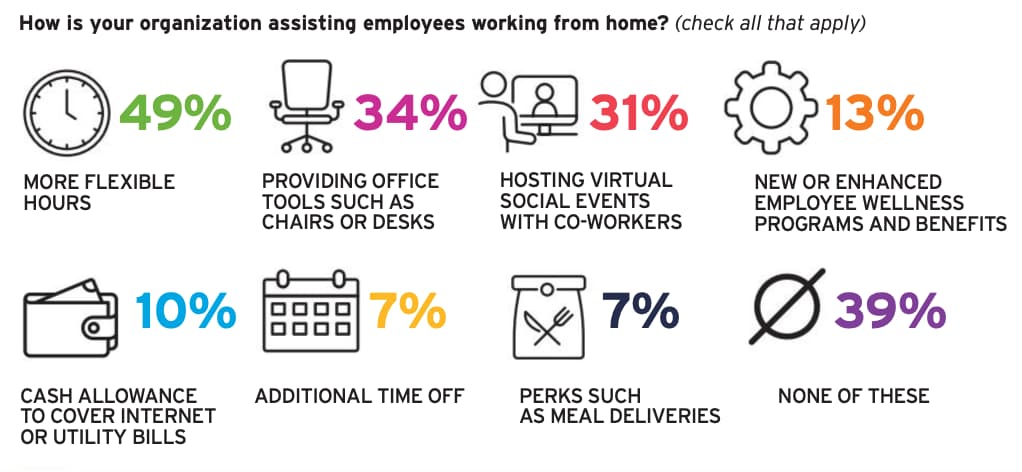The shift to virtual meetings and working from home has affected various workers differently.
While some have increased their productivity by cutting out long commutes to the office or client meetings, others are finding it harder to focus amid distractions from family members or makeshift home office setups.
With many employees still working remotely, the majority of survey respondents in the 2021 Ottawa Business Growth Survey say their organization is looking to support their staff in various ways, primarily through giving employees more flexibility around their work schedules.
(Sponsored)

Powered by passion, backed by Ontario Made: Turning bold ideas into entrepreneurial success
Back in the winter of 2018, a brutal cold snap dropped temperatures in Merrickville to -46°C. Michael J. Bainbridge and Brigitte Gall looked outside and told their holiday visitors to

The story behind Glenview Homes’ 2025 GOHBA award-winning Reveli floor plan
When Glenview Homes’ Design and Drafting Manager Eno Reveli sat down to design a new production floor plan, he wasn’t thinking about awards or show homes. He was thinking about
“We have recently surveyed our employees to gauge the eagerness to return to the office, which provides valuable intel for planning purposes. Perhaps not surprisingly, the majority of our staff would opt for a fully remote or hybrid option on a go-forward basis,” says Jim McConnery, managing partner at Welch LLP. “We are keen to accommodate a more flexible working environment, understanding that this is an important operational change for the firm, with related benefits and challenges.”

Rethinking employee engagement
The switch to remote work also forced managers to find new ways of engaging and evaluating the performance of their staff. While some employers attempted to apply their old models to a virtual world, others looked to refine their internal operations.
“Many companies tried to take their day-to-day operations and simply adapt them for remote work without realizing the opportunity in front of them,” says Dana Brown, dean of Carleton University’s Sprott School of Business. “Now is the time to rethink your style of work to improve productivity and employee happiness.”
The traditional nine-to-five managerial mindset – measuring someone’s productivity by how long they sit at their desk – is increasingly seen as ineffective. Managers are now looking at measuring outcomes rather than hours as well as giving employees more flexibility to get the job done in a time frame that works for them, adds Brown.
“The workplace is going to look different and businesses shouldn’t take that lightly,” she says. “We’ve survived these different modes of working, so now we need to ask ourselves: What lessons do we want to take forward?”

Employers are also trying to be more strategic in how they engage employees, such as limiting the number of virtual meetings to avoid strain and Zoom fatigue.
“Regardless of what our “return to office” looks like, we continue to focus on employee engagement, morale and mental health,” says McConnery. “Fortunately, the last 18 months provided comfort that we can operate effectively in a hybrid work setting.”
Managing a pandemic workforce
With many employees – and their managers – realizing they can be just as productive working remotely, survey respondents collectively predict that they will divide their time between home and the office once the health risks of COVID-19 subsides.
Managing a hybrid team can be challenging, especially if some employees prefer to work from home on a more permanent basis when their employer sees value in having them physically at the office, says Joël Dubois, a partner at law firm Perley-Robertson, Hill & McDougall.
“Unless there was a condition in the employment agreement stating an employee can work remotely, the employer has the right to recall staff to the office,” he says. “My recommendation to clients is to always regularly update your workplace policy to try and avoid any confusion or conflict.”
While employers have navigated several operational issues and questions surrounding virtual work – such as whether employees can be mandated to turn their cameras on in a meeting – vaccines will likely continue to be at centre of attention for businesses going forward.
“Mandating vaccines brings up a lot of privacy concerns and human rights questions that no one has a clear answer to right now,” adds Dubois. “It will probably be different in unionized versus non-unionized work environments as well, which adds to the complexity of the situation.”
Read the full 2021 Welch LLP Ottawa Business Growth Survey report by clicking on the cover below:







